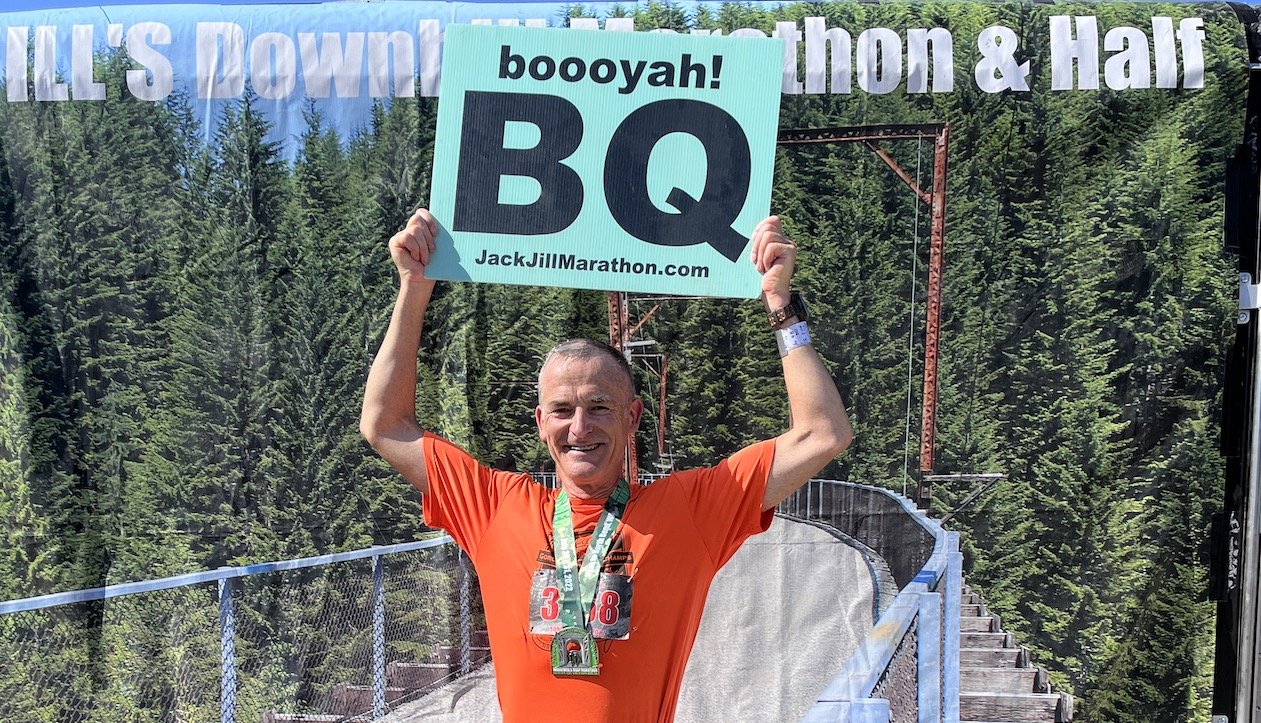Small Wins - why little steps are the path to big rewards
It was a cool July morning in the forest of Snoqualmie Valley, Washington. Just me and about 300 other nervous people in shorts - all about to run a marathon. It had been 15 years since my last marathon distance race.
Back then, I was in my 40s, and long-distance running was a normal part of my lifestyle. Just like stretching was for sissies and a ‘gel’ was for sore muscles, not something you ate.My goal was the Boston Marathon - the big daddy of marathons - one of the few you have to beat a qualifying time to enter.
Here’s what I did to prepare.
I started by learning as much as I could about qualifying - what races gave me enough time to train and had the highest percentage of qualifiers. I found my marathon, signed up, and paid the fee. I was committed. Next, I downloaded a training program that would become my bible for the next three months. Over the first few weeks, I invested in new shoes, a running app that gave me verbal feedback on my pace (I chose the chummy Boston accent - “Soooo, whatcha say you and me grab a beer after this?”), and loaded up a new Spotify playlist.
By the second month of training, I’d adjusted my diet (you eat a lot when running the equivalent of 1-2 marathons per week), was surviving interval training on the track once a week, and getting regular deep massages to keep everything working.
Fast forward three months and I was standing at the start line, ready to run my marathon. Sure I had a big goal. But that’s not how I got there.
I got there with small wins.
SMALL WINS
We live in a world that celebrates success. We celebrate athletes who beat the competition, authors who write a best-seller, and hard-driving business leaders who build an empire. You either win big or you’re not a ‘winner’.
But, that’s not how life works.
Success in life - in all areas - happens from small, often insignificant, ideas and actions that move us closer to our goals. I call these small wins. A small win is a single step, requiring little time or effort, that moves you closer to your goal. And when you experience a small win you feed a progress loop that is hungry to seek the next small win. “
Of all the things that can boost emotions, motivation, and perceptions during a workday,” writes author Teresa Amabile in a recent HBR article, “the single most important is making progress in meaningful work.”
The trick is to shift your thinking from what you want to what you can do now, in the present. And to be okay that it may not feel like much progress. In fact, it is progress.
From wanting to qualify for the Boston Marathon to standing at the start line, every small win got me closer to my goal. And the first small win was awareness.
Aware, Better, Commit
Reducing an ongoing frustration or goal into a small win is made easier by following three simple steps. I use this process to sort through business decisions, travel planning, scheduling my week, and especially for tackling those seemingly insurmountable goals that I seem to attract.
It goes like this…
Aware - pay attention to daily stressors, barriers, time-wasters, and interruptions that get in the way of getting more of what you want. Define them, journal about them, and measure their impact on your life, work, and health. Now choose one to focus on.
Better - the secret to all change is asking the right question. Asking “Why am I always so stressed out?” delivers reasons why you are stuck. Instead, ask “What is one thing I can do right now that will move me 1% closer to my goal?” The more specific, action-oriented the question (remember SMART goals?) the better.
Commit - take one step. It could be a one-time solution, or the start of a routine - either way, take the step without hesitation. You are moving forward, learning, and exploring what it feels like to get closer to your goal. And don’t worry if it won’t rock your world - the goal is just to give it a shake.
Examples of Small Wins
Here are a few examples of small wins to get you started.
More time
If you feel your day is lost in a wave of appointments, emails, interruptions, and family demands, try blocking time just for you. This is sacrosanct, non-negotiable time - even as little as 20 minutes - that’s all yours. You can go for a walk, read, knit a sock, or just take a nap - whatever makes you feel good.
More control
If you want to reduce overwhelm at work find something you can do in 5 minutes or less that makes you feel more in control. Once a week I clear my desk of notepads, project files, bills, and half-read books. Five minutes and I feel more in control.
Better health
Maybe you want to exercise more often, but past efforts have all failed. The solution is small wins. Get a physical exam, read a book about exercise, (I recently read two books about building muscle and aging), build 15 minutes into your morning routine for exercise and start recording every time you successfully exercise.
Your next small step might seem tiny or inconsequential at the time. After all, this is only one step—you still haven’t reached some ultimate goal. The reality is that your next small step is exactly what you need to take to reach that ultimate goal. It’s the only thing that ever has.
PS. I did qualify for Boston!
Small Wins - Why Little Steps are the Path to Big Rewards
Keynotes and workshops by Hugh Culver


